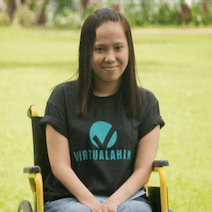SUMMARY
This is AI generated summarization, which may have errors. For context, always refer to the full article.
![[OPINION] Muscles shrinking, hope expanding: A life of physical paralysis](https://www.rappler.com/tachyon/r3-assets/612F469A6EA84F6BAE882D2B94A4B421/img/16FAFD66AC0E4B0ABC0472DD2F58CF50/ispeak-wheelchaired-vitrual-assistant.jpg)

Life, as they say, is never fair. Many are privileged, but many are not. For as long as I’ve lived, I’ve always thought of the unfortunate events I’ve had to go through, and have asked myself the whys and why nots of my existence.
I was born with a sickness that resulted in lifetime physical paralysis. It’s a very rare condition called Duchenne Muscular Dystrophy (DMD). This condition attacks the muscles, causing them to shrink to the point of immobility. Most of those who have DMD are men, and it is rare among women. Unfortunately, I am one of the very few women who have this condition. (READ: Hard truths about disasters and women with disabilities)
Growing up was a struggle, to say the least. You see, I had perfect mobility when I was in the early part of my elementary years. I could run and play around. But when I was in third or fourth grade, I noticed the gradual change of my walking pace. I also became more lethargic as the days passed.
I got bullied at school because of the peculiarity of my walk. The worse part was, I was clueless about what was going on with me. My family and I weren’t able to seek medical attention because of our finances, since my mother was a plain housewife and my dad was a contractual carpenter. Going to the doctor was a luxury we could not afford. (READ: PWDs and the Philippine media)
In high school, the muscles in my lower extremities completely shrunk, and I couldn’t walk on my own. I became officially impaired. I had to use a wheelchair to move around.
Despite that, I was blessed to have a relative who helped us buy a second-hand wheelchair. After high school, I knew attending a regular university would be hard with my condition but I still managed to finish a certificate program on Microsoft Office.
I strived and thrived on whatever opportunity was presented me, because I’d always wanted to give back to the people who have sacrificed for me – my parents. But unfortunately, many people like me, people with disabilities, are not given equal chances to make a living like regular people. Most of us are subject to pathetic social stigmas because of our disabilities. (READ: [OPINION] We are more than our disabilities)
I know that in our little way we can still do something, that we can have jobs and earn a living, but for a time I only believed this to be a dream; a dream I thought would never be possible in my lifetime. But I was wrong, because God works wonders.
I was introduced to a virtual company that trains people with disabilities to have virtual skills and then helps us find online jobs. After my training, I was immediately hired and became a virtual assistant.
I was happy beyond compare! I was more than excited and proud because I was earning more than I expected. Finally, I was able to help my parents. I also got to connect with other PWDs who have other conditions. I got to share the wonderful things life offers despite my special needs and everyday struggles. (READ: Swimmer with no legs guns for gold)
I know my condition is hard and it gets harder by the day, but knowing that I have a family who supports me and a community that empowers me, I will continue living, because living with purpose gives me hope. – Rappler.com
Mary Grace de Loyola was born with Duchenne Muscular Dystrophy (DMD). Her experiences have fueled her to fight not just for her life, but also the stigma and discrimination commonly faced by people like her.
Add a comment
How does this make you feel?
There are no comments yet. Add your comment to start the conversation.